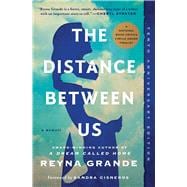
Note: Supplemental materials are not guaranteed with Rental or Used book purchases.
Purchase Benefits
What is included with this book?
The New copy of this book will include any supplemental materials advertised. Please check the title of the book to determine if it should include any access cards, study guides, lab manuals, CDs, etc.
The Used, Rental and eBook copies of this book are not guaranteed to include any supplemental materials. Typically, only the book itself is included. This is true even if the title states it includes any access cards, study guides, lab manuals, CDs, etc.
Prologue
Reyna, at age two
MY FATHER’S MOTHER,Abuela Evila, liked to scare us with stories of La Llorona, the weeping woman who roams the canal and steals children away. She would say that if we didn’t behave, La Llorona would take us far away where we would never see our parents again.
My other grandmother, Abuelita Chinta, would tell us not to be afraid of La Llorona; that if we prayed, God, La Virgen, and the saints would protect us from her.
Neither of my grandmothers told us that there is something more powerful than La Llorona—a power that takes away parents, not children.
It is called The United States.
In 1980, when I was four years old, I didn’t know yet where the United States was or why everyone in my hometown of Iguala, Guerrero, referred to it as El Otro Lado, the Other Side.
What I knew back then was that El Otro Lado had already taken my father away.
What I knew was that prayers didn’t work, because if they did, El Otro Lado wouldn’t be taking my mother away, too.
Prologue
IN 2010, TWENTY-FIVEyears after my new life in the United States began, my father was diagnosed with liver cancer. By then, my siblings and I had little communication with him. By then, he’d managed to chase us away. But as is often the case with terminal illnesses, broken families put themselves back together, and I began to find my way back to my father, although the journey—like the one I took across the U.S.-Mexico border—was not at all easy.
On Tuesday, September 6, 2011, the day before my thirty-sixth birthday, Mago, Carlos, and I found ourselves around my father’s hospital bed listening to the doctor tell us he had done everything he could for him. The doctor said we should let our father go.
He didn’t know about all the times I had already lost him. Back in Mexico, there was always the hope that he would return. But now there was no hope to cling to. If we let him go, he would not be coming back.
I turned to look at my father. He lay on his hospital bed, only 130 pounds of flesh and bones. His face was sunken in. His skin sagged from all the weight he’d lost. Once, his skin was the color of rain-soaked earth. Now, it was a dull grayish color—like in that black-and-white photograph of him I so cherished. I could tell that he was not here. His eyes were slightly open, and they were glazed over, looking into space, looking at nothing. I wanted him toseeme. I had always wanted to beseenby him.
I couldn’t follow all the cords and hoses that came in and out of him. I couldn’t understand all the numbers on the monitors next to him. But the wavy lines that represented his heartbeat told me of the conflict within him. His mind had already gone elsewhere. Yet, his heart struggled to hold on. It was fighting a losing battle. His blood pressure was now down to sixty.
The doctor waited for our decision.
I looked at Mago, then at Carlos. Betty lived in Watsonville, a six-hour drive from Los Angeles. But even if she lived here she would not have come. My mother knew what she was doing when she did not allow my father to take Betty. So now it was Mago, Carlos, and I who got to decide our father’s fate. Were they thinking what I was thinking? How shocking it was to see him like that. I wanted to remember him how he once was. Robust. Strong. Proud. Cancer had taken so much from him already. It had humbled him in a way I never imagined him being humbled.
“Okay,” we said. Mago, Carlos, and I looked at one another and nodded, reassuring ourselves of our mutual decision. “Okay,” we said again.
“I’m sorry,” the doctor said. “It’ll be over quickly. He won’t suffer.”
We stood around our father. The machines were disconnected one by one from his body. During the interminable twenty minutes that it took for my father’s heart to stop beating, the years I spent with him flashed through my mind, from the moment I first laid eyes on him after our eight-year separation, to the first day I came to live with him, to the day I left his house for the last time, to now.
I reached to grab his hand, that hand that was the exact shape of my own, and I held on tight.